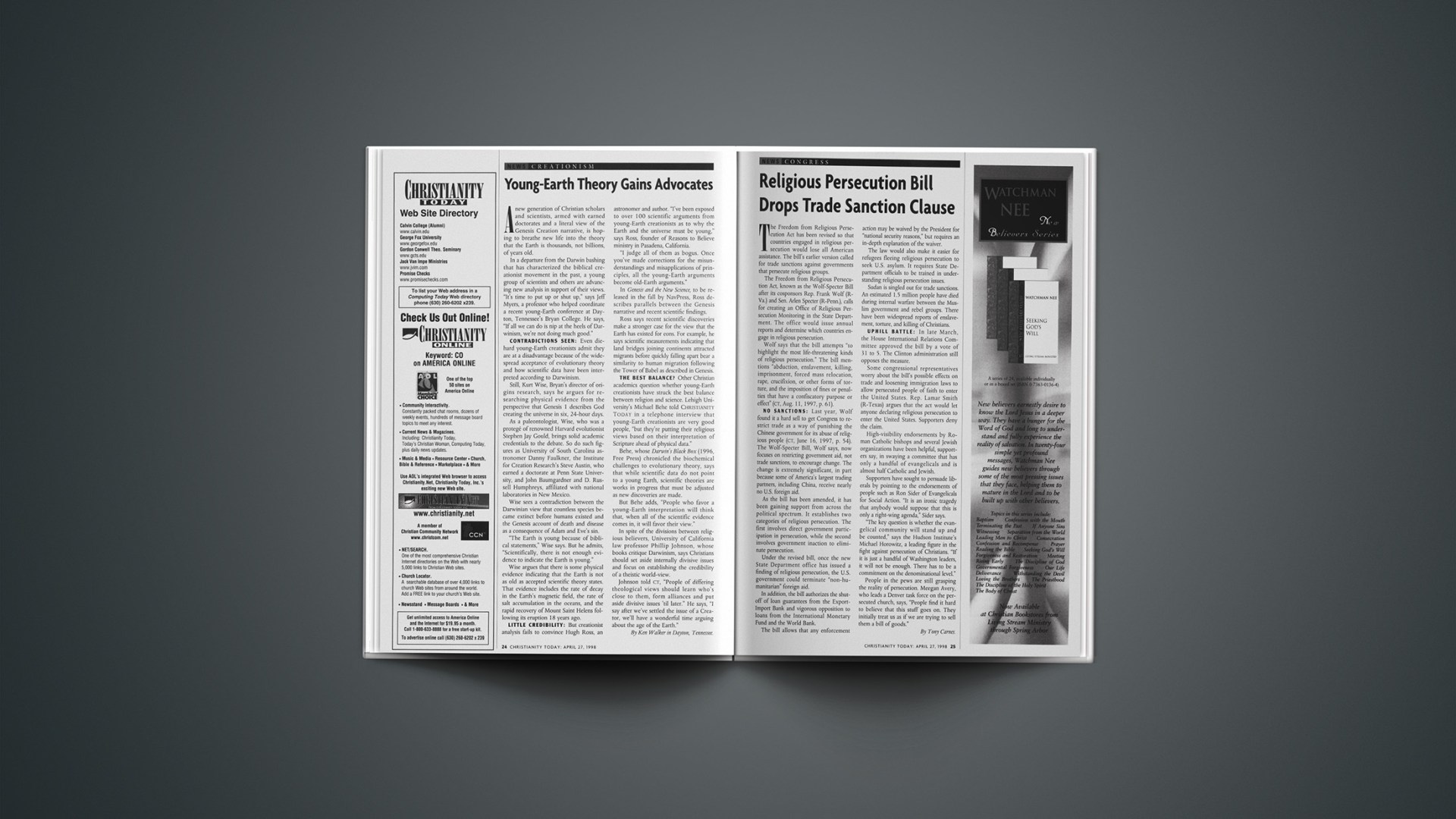A new generation of Christian scholars and scientists, armed with earned doctorates and a literal view of the Genesis Creation narrative, is hoping to breathe new life into the theory that the Earth is thousands, not billions, of years old.
In a departure from the Darwin bashing that has characterized the biblical creationist movement in the past, a young group of scientists and others are advancing new analysis in support of their views. “It’s time to put up or shut up,” says Jeff Myers, a professor who helped coordinate a recent young-Earth conference at Dayton, Tennessee’s Bryan College. He says, “If all we can do is nip at the heels of Darwinism, we’re not doing much good.”
CONTRADICTIONS SEEN: Even die-hard young-Earth creationists admit they are at a disadvantage because of the widespread acceptance of evolutionary theory and how scientific data have been interpreted according to Darwinism.
Still, Kurt Wise, Bryan’s director of origins research, says he argues for researching physical evidence from the perspective that Genesis 1 describes God creating the universe in six, 24-hour days.
As a paleontologist, Wise, who was a protege of renowned Harvard evolutionist Stephen Jay Gould, brings solid academic credentials to the debate. So do such figures as University of South Carolina astronomer Danny Faulkner, the Institute for Creation Research’s Steve Austin, who earned a doctorate at Penn State University, and John Baumgardner and D. Russell Humphreys, affiliated with national laboratories in New Mexico.
Wise sees a contradiction between the Darwinian view that countless species became extinct before humans existed and the Genesis account of death and disease as a consequence of Adam and Eve’s sin.
“The Earth is young because of biblical statements,” Wise says. But he admits, “Scientifically, there is not enough evidence to indicate the Earth is young.”
Wise argues that there is some physical evidence indicating that the Earth is not as old as accepted scientific theory states. That evidence includes the rate of decay in the Earth’s magnetic field, the rate of salt accumulation in the oceans, and the rapid recovery of Mount Saint Helens following its eruption 18 years ago.
LITTLE CREDIBILITY: But creationist analysis fails to convince Hugh Ross, an astronomer and author. “I’ve been exposed to over 100 scientific arguments from young-Earth creationists as to why the Earth and the universe must be young,” says Ross, founder of Reasons to Believe ministry in Pasadena, California.
“I judge all of them as bogus. Once you’ve made corrections for the misunderstandings and misapplications of principles, all the young-Earth arguments become old-Earth arguments.”
In Genesis and the New Science, to be released in the fall by NavPress, Ross describes parallels between the Genesis narrative and recent scientific findings.
Ross says recent scientific discoveries make a stronger case for the view that the Earth has existed for eons. For example, he says scientific measurements indicating that land bridges joining continents attracted migrants before quickly falling apart bear a similarity to human migration following the Tower of Babel as described in Genesis.
THE BEST BALANCE? Other Christian academics question whether young-Earth creationists have struck the best balance between religion and science. Lehigh University’s Michael Behe told Christianity Today in a telephone interview that young-Earth creationists are very good people, “but they’re putting their religious views based on their interpretation of Scripture ahead of physical data.”
Behe, whose Darwin’s Black Box (1996, Free Press) chronicled the biochemical challenges to evolutionary theory, says that while scientific data do not point to a young Earth, scientific theories are works in progress that must be adjusted as new discoveries are made.
But Behe adds, “People who favor a young-Earth interpretation will think that, when all of the scientific evidence comes in, it will favor their view.”
In spite of the divisions between religious believers, University of California law professor Phillip Johnson, whose books critique Darwinism, says Christians should set aside internally divisive issues and focus on establishing the credibility of a theistic world-view.
Johnson told CT, “People of differing theological views should learn who’s close to them, form alliances and put aside divisive issues ’til later.” He says, “I say after we’ve settled the issue of a Creator, we’ll have a wonderful time arguing about the age of the Earth.”
Copyright © 1998 Christianity Today. Click for reprint information.










